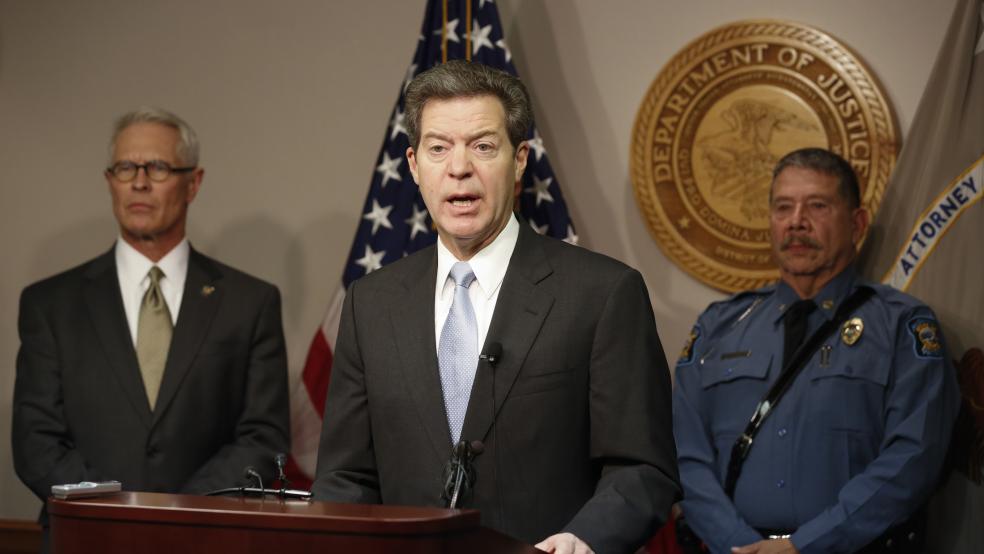Few politicians put more store in the supply-side economics magic of Reagan-style tax cuts than Republican Gov. Sam Brownback of Kansas.
Certain that he could spur his state’s economy, create “tens of thousands of jobs” and provide a model for other Republican governors to emulate, Brownback pushed a major tax system overhaul through the state legislature in 2012, including a 25 percent reduction in the top income tax rate and elimination of taxes on various types of income such as non-wage small business income.
Related: Why State Tax Cuts Aren’t Driving Job Growth
But the experiment by this acolyte of President Ronald Reagan “has caused a steep drop in state revenues, while not yet delivering the outsized economic growth,” according to the Wall Street Journal. And rather than reaping political benefit, Brownback has suffered major defections within his party as he faces a tough challenge from Democrat Paul Davis, the state House Minority Leader who until recently was viewed as a very long shot in this red state.
In a startling rebuke to the governor, more than 100 Kansas Republican officials endorsed Davis on Tuesday, a rarity in statewide races and a wakeup call for Brownback, an arch conservative on economic and social issues and a former U.S. senator. The defectors said they are as concerned about cuts in education and other government services as well as the tax cuts that have left the state with a major hole in its budget.
“We are deeply concerned by the direction Sam Brownback is taking Kansas,” said Wint Winter, a former state senator who is supporting Davis, according to the Wall Street Journal account. “We are all Republicans. But we will always be Kansans first.”
Related: Gov. Jerry Brown Uses Surplus to Prevent Bankruptcies
Ironically, while California, Ohio and scores of other states are reveling in surging revenues and budget surpluses, Brownback and other Kansas state officials are struggling to plug a gaping hole in their revenue estimates. State officials anticipated collecting $651 million from personal income tax in April and May, but instead received only $369 million with little time remaining in the state’s fiscal year.
Brownback and other state officials have downplayed the significance of the shortfall, saying that it was caused in part by changes in the capital gains law as part of the congressional “Fiscal Cliff” deal in January 2013.
If the state manages to meet its revenue projections for the next 12 months, it will be left with a balance of $56 million by the end of fiscal year 2015, according to the Wichita Eagle.
“We’ll finish this year with several hundred millions of dollars cash on hand … so we’re going to be in fine shape,” Brownback told the newspaper. “We projected a dip. We’ve had good overall performance of our agencies being able to hold back costs, so it’s two sides of the equation.
But a report by the Rockefeller Institute of Government found that Kansas is one of six states that has experienced a double-digit percentage decline in personal income tax revenue.
Related: No Job Loss in Most States That Raised Minimum Wage
“The declines in income tax collections appear to have been driven mostly by behavior of taxpayers, who shifted income from tax year 2013 to tax year 2012 to minimize federal tax liability,” the report stated. “The situation was further complicated in states that reduced income tax rates, including Kansas, Maine, Michigan, Nebraska, North Dakota, and Ohio, where it was difficult to sort out the effects.”
Adding to the Kansas state government’s fiscal woes, Moody’s Investors Service cut its credit rating this spring, while Davis has accused Brownback’s administration of “starving local schools.”
The non-partisan Cook Political Report last week moved the governor’s race from leaning Brownback’s way to a “toss-up,” noting that the governor’s administration is also beset with an influence peddling investigation.
“Democrats believe that they have a strong candidate in . . . Paul Davis, who is said to be moderate enough to appeal to some Republican voters,” the Cook Report explained. “Polling shows a single-digit race, with the most recent survey conducted at the end of June giving Davis a six-point advantage.”
Top Reads from The Fiscal Times





